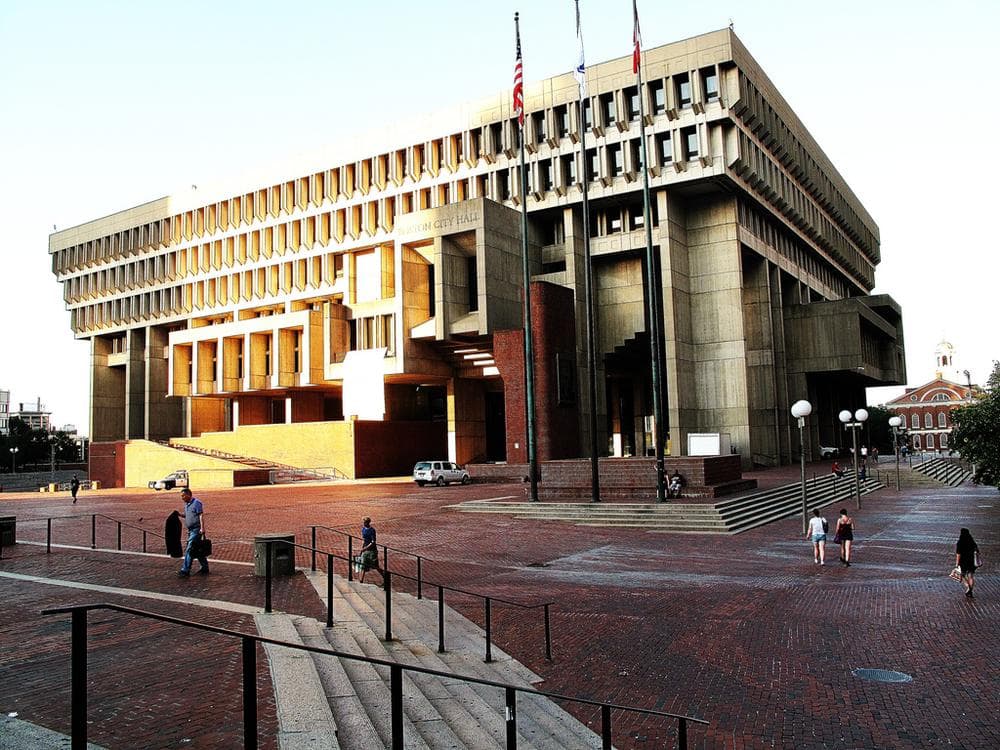Advertisement
With Campaign Heating Up, Walsh Proposes Selling City Hall

State Rep. Martin J. Walsh said Sunday he would sell City Hall and the surrounding plaza to a developer and push for a new, privately financed City Hall nearby if elected mayor.
Walsh said the sale would generate $125 to $150 million for the city and clear the way for a major new mixed-use development — possibly including a hotel, office space, residential and retail — in a section of the city that's seen halting growth.

"It's been a common theme in this election: where's the expansion of Boston as far as the economy, as far as creating jobs?," he said. "When you look at this, there's a rare opportunity here."
Walsh's pitch comes as the mayoral election enters a crucial phase, with just over a week to go before voters winnow the field from 12 to two in the preliminary election.
A new poll commissioned by The Boston Globe shows a tight race. Walsh, with 8 percent of the vote, is tied for third in the survey — trailing City Councilor John Connolly at 13 percent and former state Rep. Charlotte Golar Richie at 9 percent. One in three voters is still undecided.
With so many still making up their minds, and so little daylight between the candidates on most of the major issues, the mayoral hopefuls are looking to distinguish themselves with unique proposals.
Walsh's proposal, though, is not entirely new.
Mayor Thomas M. Menino, who is stepping down in January after two decades in office, twice proposed selling the windswept City Hall Plaza — once in 1998 and again in 2006, when he called for the construction of a new City Hall on the South Boston waterfront.
Advertisement
The plan never got traction, though. And Menino shelved it in 2008, saying it wasn't appropriate to pursue the idea in the midst of the recession.
Walsh, who left his post as head of the Boston Building Trades to run for mayor, faced quick criticism from his opponents Sunday night.
"This idea is not original; similar schemes have been proposed before," read a statement from Suffolk County District Attorney Daniel Conley's campaign. "Dan's focus will be on job creation, education reform, and preserving the middle class, not make-work projects for Marty's unions. The next mayor will only have limited resources, and Dan intends to spend his wisely."
"Boston is hungry for new ideas, not just a recycled debate about moving City Hall," said City Councilor Mike Ross, another candidate. "The next mayor needs to be focused on developing our neighborhoods, many of which haven't shared in Boston's boom."
Walsh's plan for a new City Hall does differ from the Menino proposal in at least one important way.
Critics said a South Boston City Hall would be difficult to access. And Walsh would site the new building downtown — in or near Government Center, Downtown Crossing or the Financial District.
"I don't need to have a waterfront view as mayor of the city of Boston," Walsh said.
Walsh said the building could go up on public land — possibly at the site of a city-owned parking garage in Winthrop Square or at the Boston Public Schools Court Street headquarters, which is slated to move to Dudley Square in Roxbury.
The new City Hall could include ground-floor retail and offices for other tenants, depending on the location, according to the campaign. The city would lease space from the developer for 20 to 40 years, under Walsh's plan, before buying it for $1.
Walsh said he had not yet spoken to any developers about their interest in building on City Hall Plaza. But he predicted strong interest.
He said the mixed-use development would connect historic Fanueil Hall, situated behind City Hall, to Boston Common and the rest of the downtown area.
The development, he added, would make for a better fit with the city's increasingly round-the-clock economy than City Hall, which is open from 8:30 am to 5:30 pm Monday through Friday.
Walsh said he would use the one-time revenue from the sale — plus estimated annual property tax receipts of $10 to $12 million for the City Hall Plaza development and $5 to $6 million for the new City Hall building — to help underwrite plans for universal early childhood education, park improvements and public art.
He said he would put part of the proceeds into the city's rainy day fund, as well.
City Hall was built during urban renewal in the 1960s — a towering, Brutalist collection of brick and concrete that is not much loved in the city.
Former mayoral aide Carter Wilkie, in an interview with ArchitectureBoston magazine, once lamented "all of the dark, gloomy bleak concrete, wall after wall of it" and said "even the spaces that should be monumental in a public building are a real disappointment."
Still, the building does have its supporters — several of whom voiced opposition to Menino's plans to dismantle it.
This program aired on September 16, 2013. The audio for this program is not available.